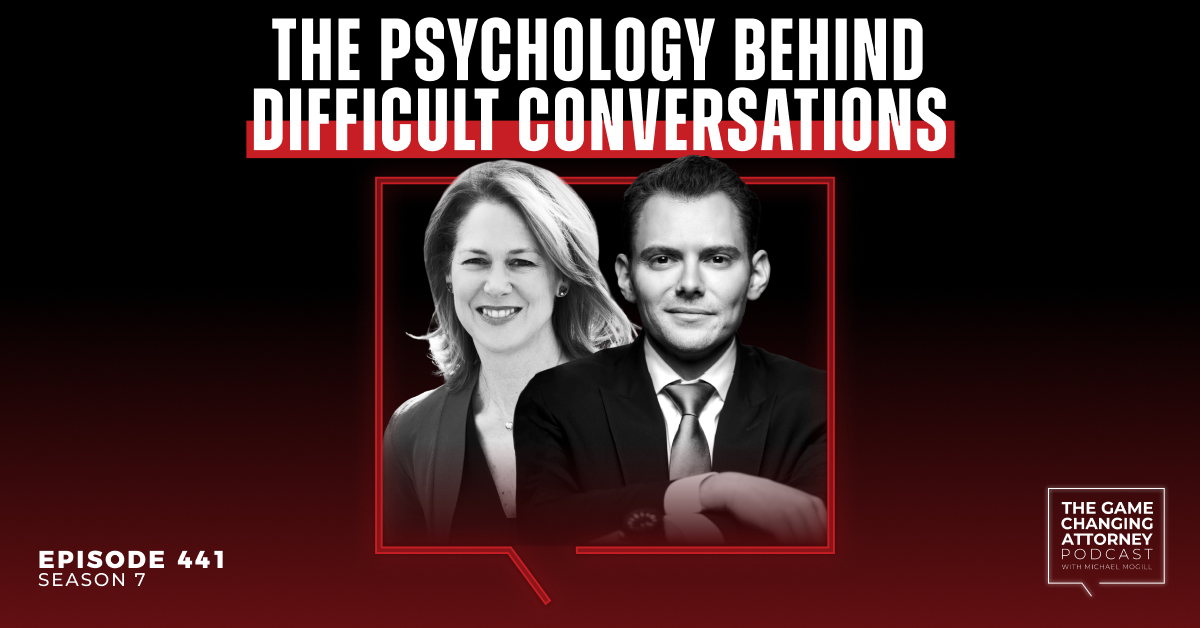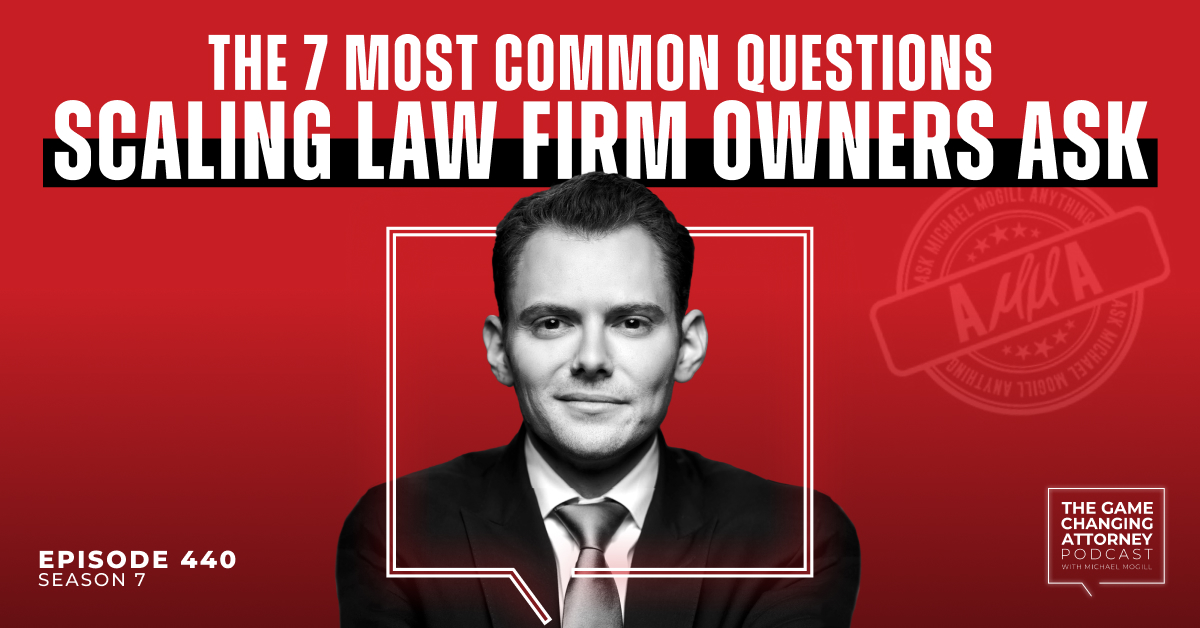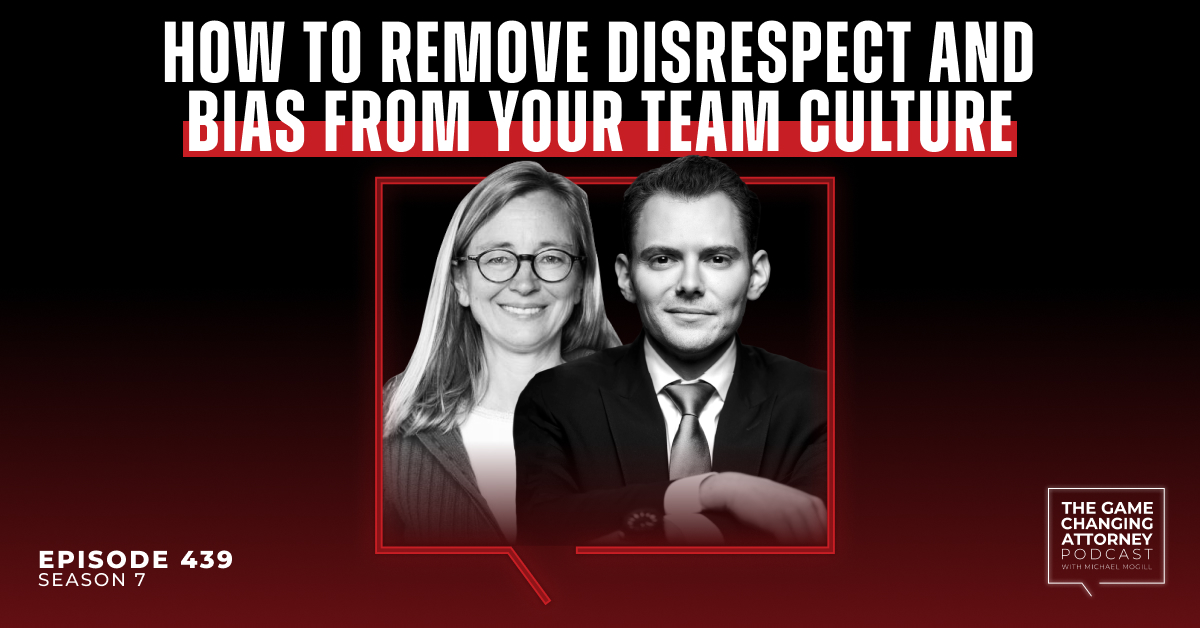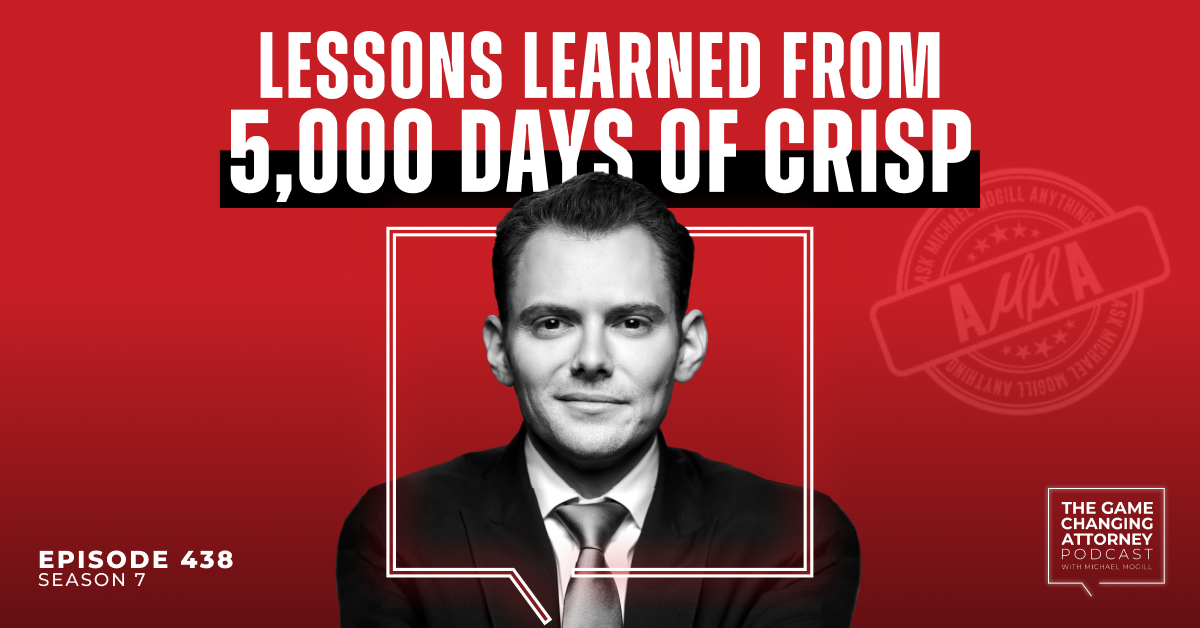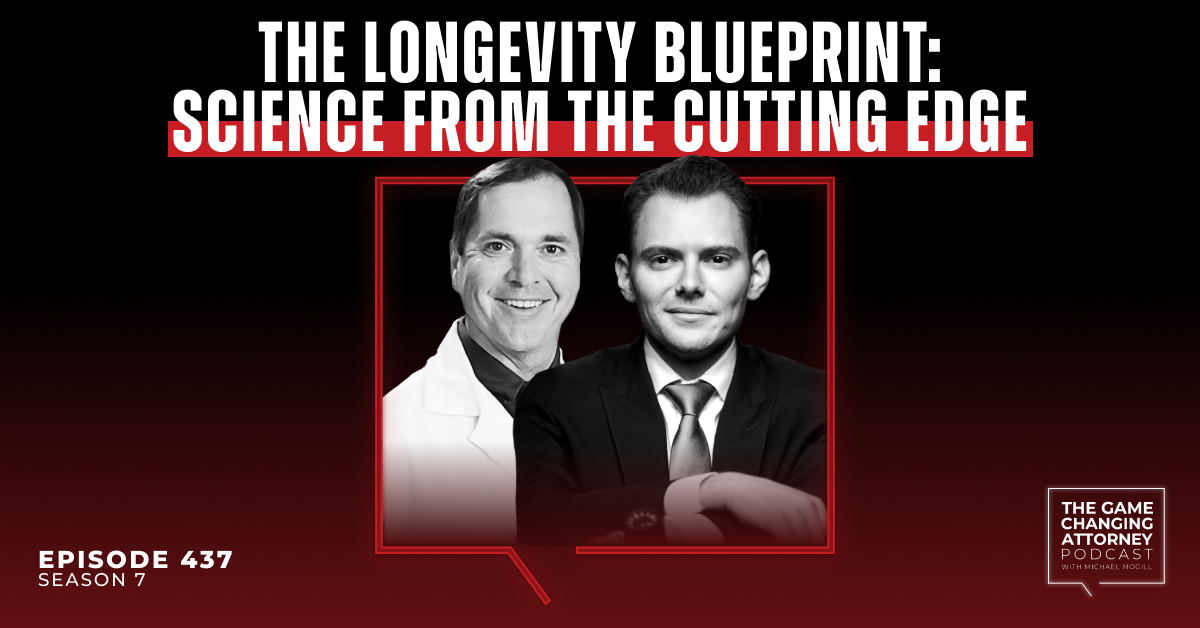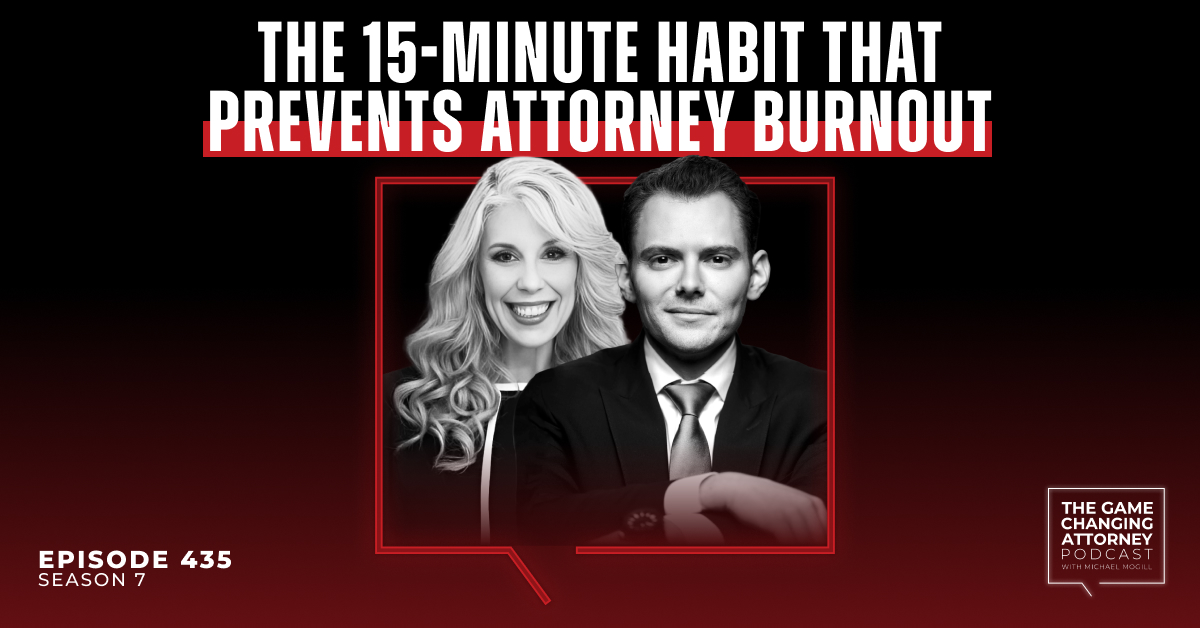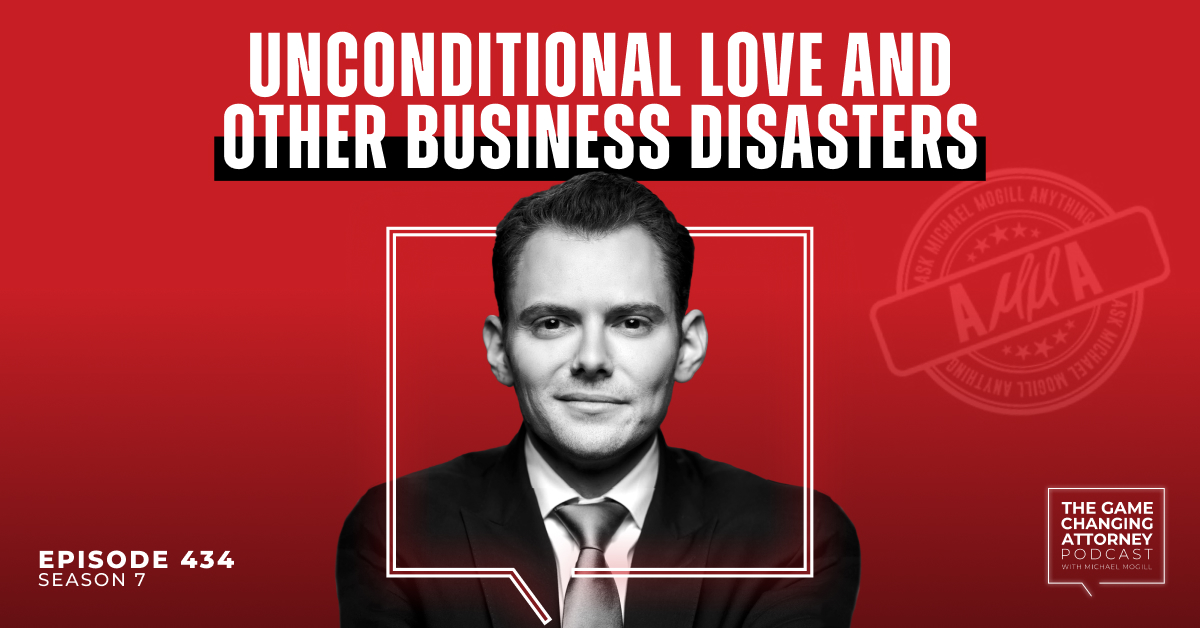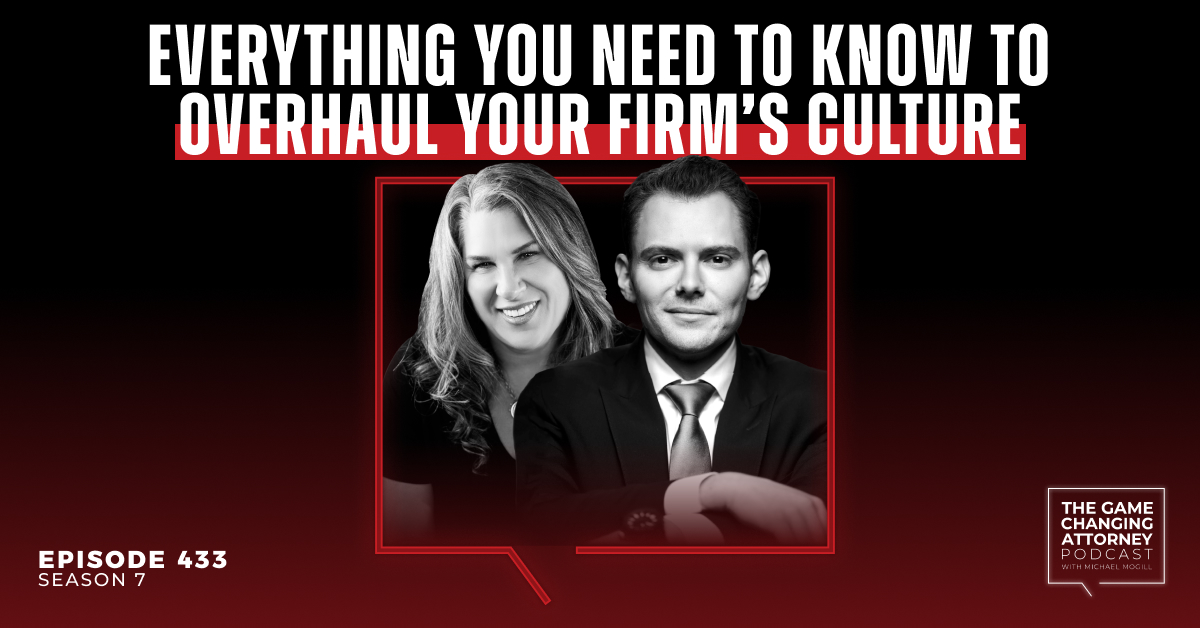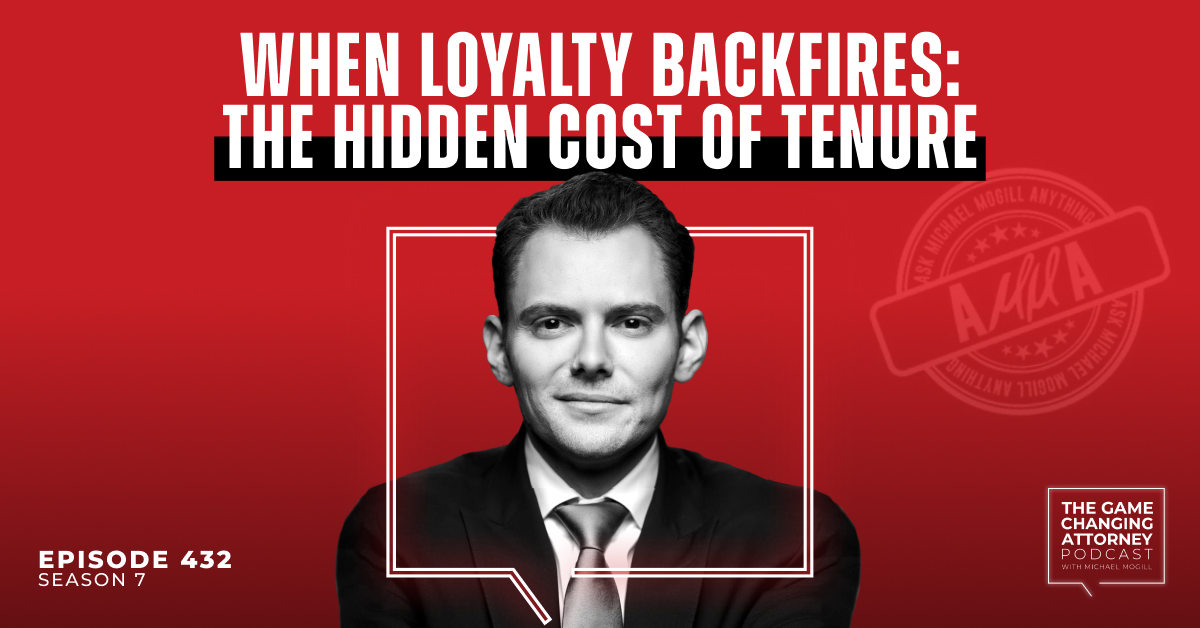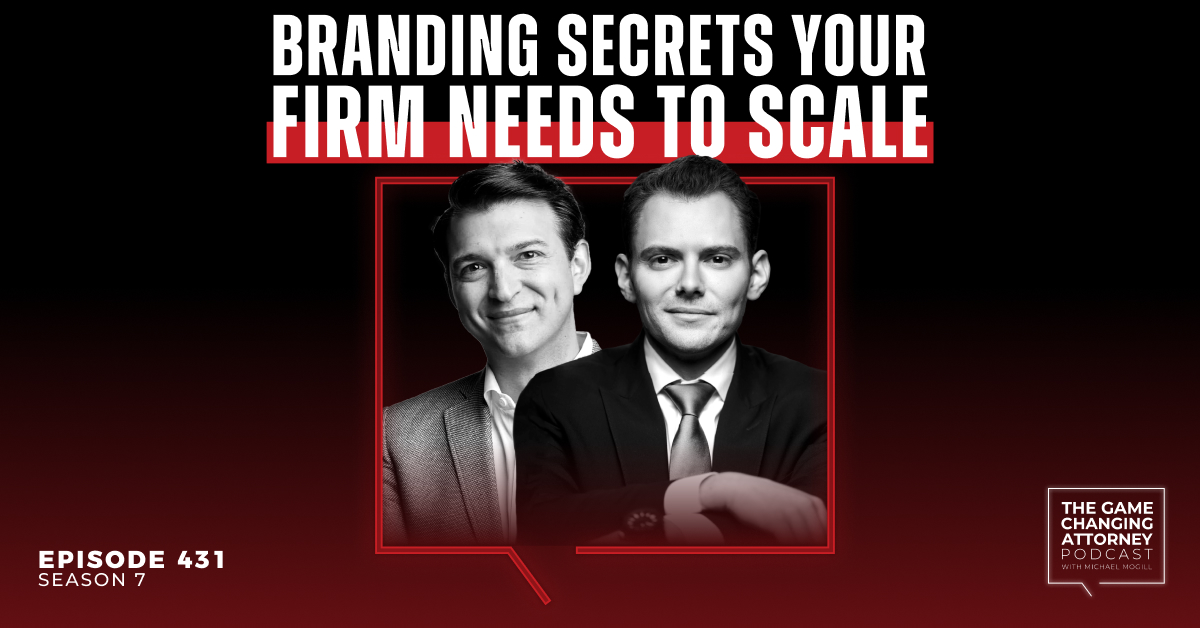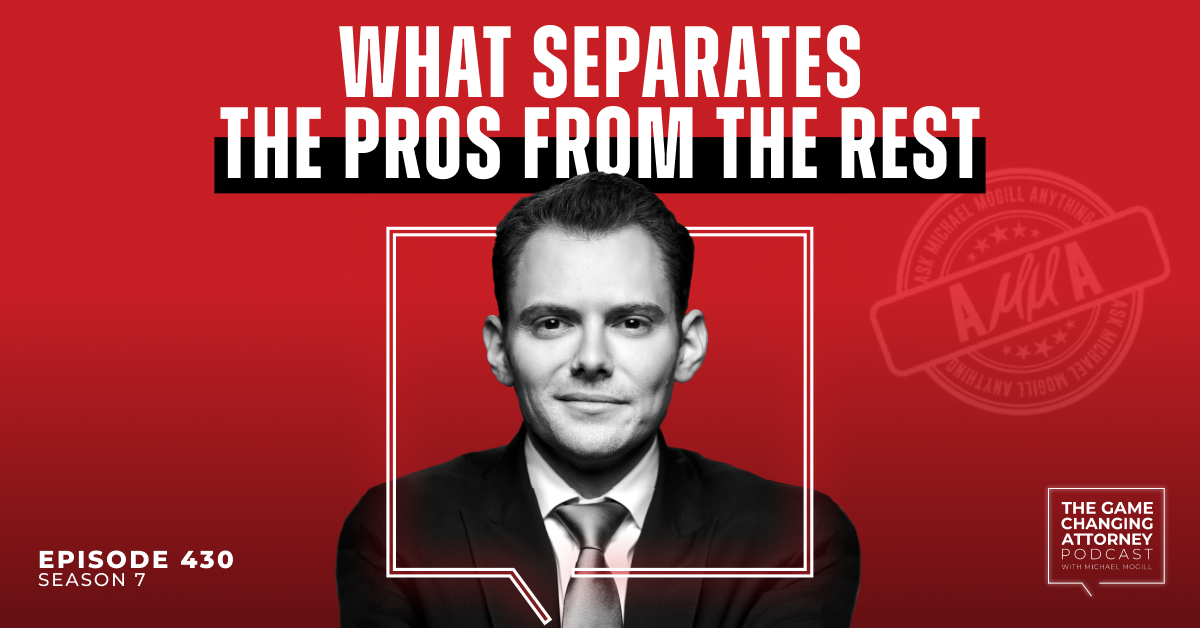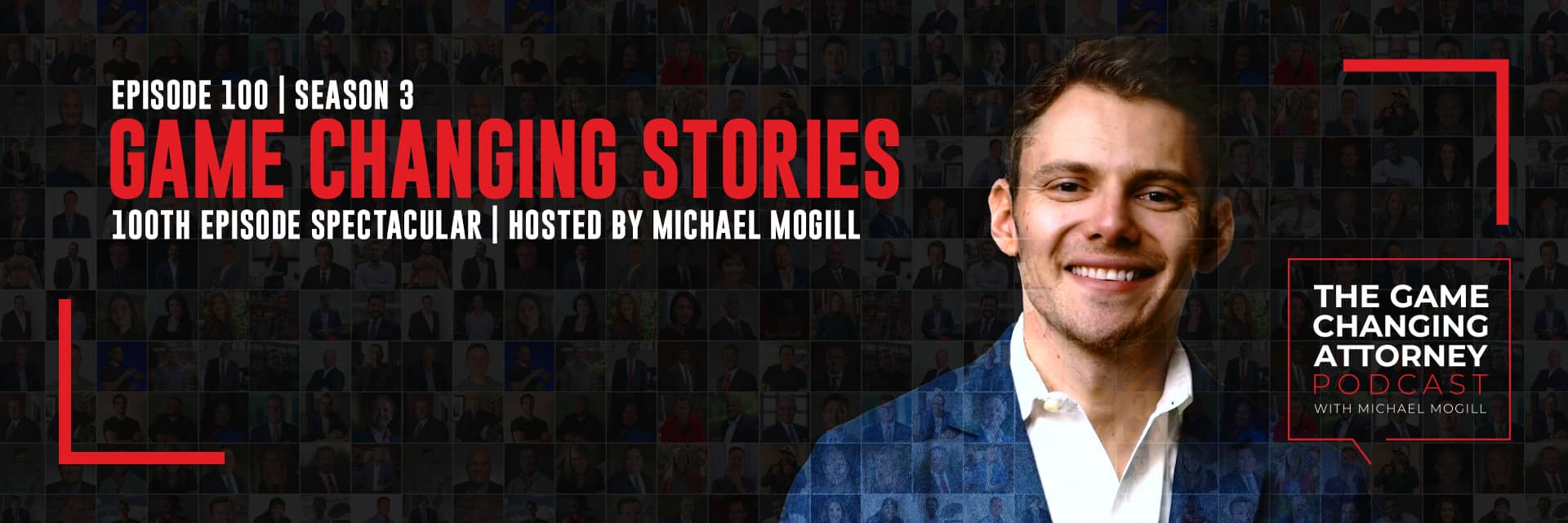
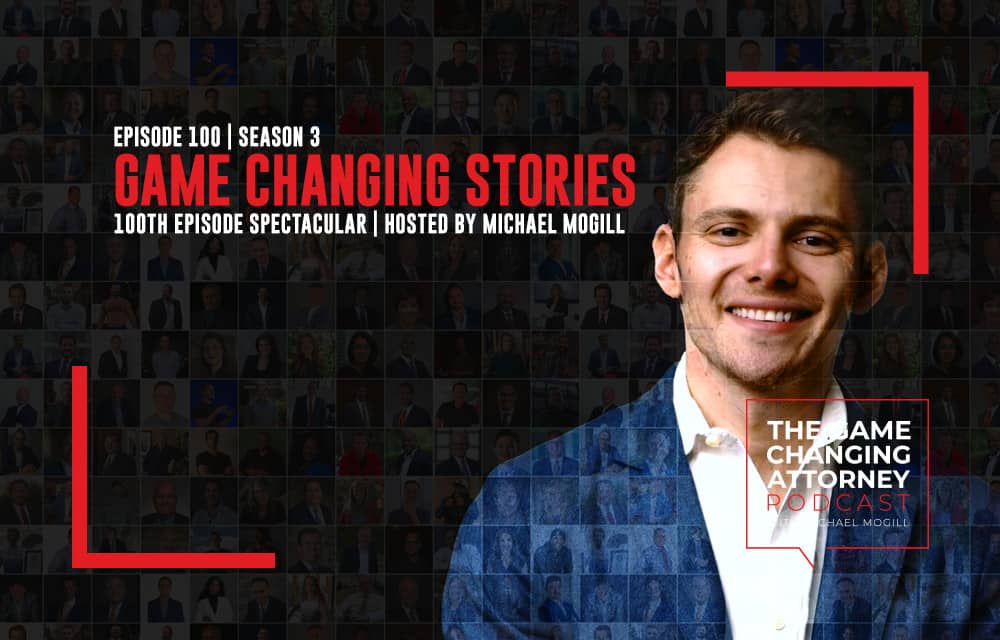
Episode 100 — Game Changing Stories: 100th Episode Spectacular
The 100th episode of The Game Changing Attorney Podcast is finally here. What began as a means of understanding the inner workings of game changers’ brains has become an unstoppable force.
This extra special episode revisits and reimagines some of the greatest discussions in this podcast’s history, such as:
- The importance of never being complacent
- Working hard to get what you want out of life and yourself
- How game changers set themselves apart
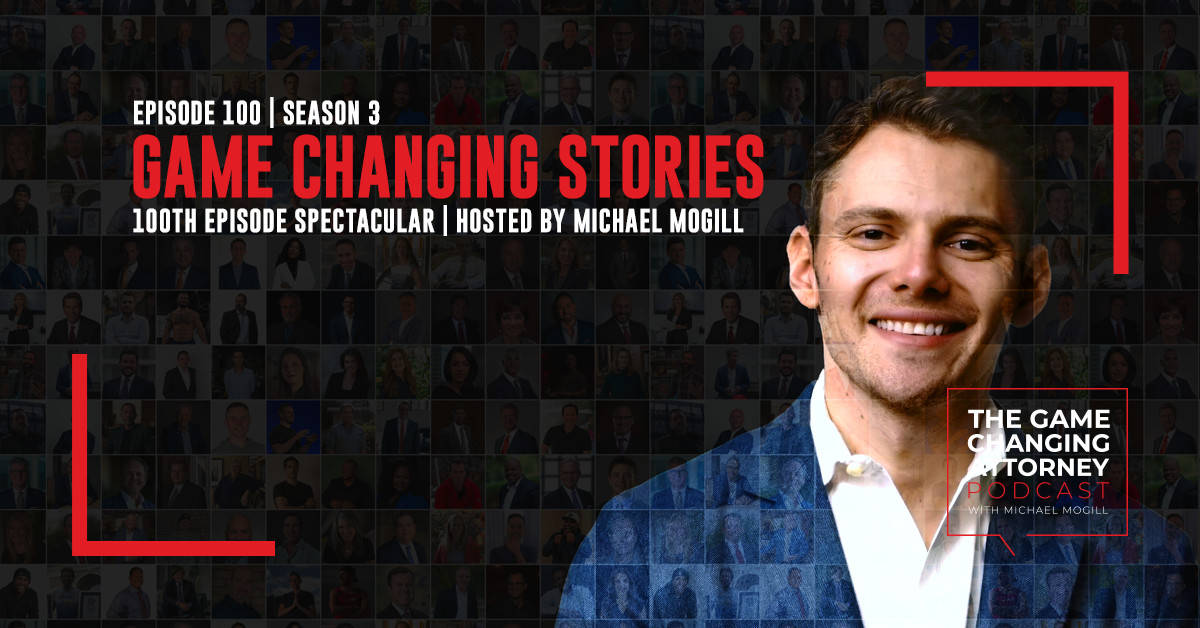
Listen & Subscribe
Show Notes:
Episode 1 — John Morgan
We’re animals in the jungle. “In the jungle today, a lion will be born. And that lion is the king of the jungle, just because he or she is a lion. The same day, a sloth will be born. Same day, same jungle, same deal. That sloth is so f*cked. He can’t even describe it. All he can do is barely muster up enough energy to come down the tree, grab some berries, go to the bathroom, go back up, and go to sleep.”
Confidence takes you places. “I don’t think anybody can wipe me out. I don’t think anybody works harder than me. I don’t think anybody has the imagination that I have. There was nobody on the back of phone books until me. Before I went to law school, I sold Yellow Pages, and I thought, ‘That’d be the place I want to be.’ There were no lawyers on billboards or buses until me. I don’t think anybody could ever put me out of business.”
Episode 5 — Chris Voss
The mindset of discovery. “The mindset of discovery is actually a hack for you. It’s basically a positive frame of mind, and it’s curious. You can actually take in more information. You see things faster when you’re in that mindset. You pull in more data. Your pattern recognition increases — all the things that go to higher mental performance. So first of all, if you have a mindset of discovery you’re going to be smarter. Probably at least 31% smarter, which is enough of an edge that if you’re interested in edges, you’re going to want it.”
How to deliver bad news. “You just say, ‘I got bad news.’ Wait about a second, and you deliver the news. Never let somebody get blindsided by bad news. They need about a second to prepare themselves, no matter how bad the news is. If you wait longer than a second, now they really start to spin down. You don’t go, ‘You’re not going to like this. Are you sitting down?’ All that nonsense. People are remarkably resilient if you give them a second to brace themselves. So that’s the way you deliver bad news.”
Rip the Band-Aid off. “That attempt to soften it is well intentioned but torturous. You know, you rip the Band-Aid off. Just because you don’t want it to hurt doesn’t mean you should rip it off more slowly. The most humane thing to do is to let them have it. Don’t let them twist in the wind; you cannot soften a blow. There is no gentle way to cut off somebody’s head — unless you try to cut it off nicely, but then it’s going to be torture.”
Episode 15 — Mark Lanier
Having a David mindset in the courtroom. “I don’t get nervous; I get excited. You know, it’s really interesting, and this again is part of how I try a case from out of my faith. You know I’m in there because I think this is where God wants me to be — that clarity of purpose you were talking about before. I think this is what I’m supposed to do. You know, David wasn’t nervous when he was picking up the stones and he was about to fight Goliath, even though Goliath was a giant that frightened the rest of Israel.”
Episode 25 — Kim Scott
Learning from feedback. “My boss Sheryl Sandberg says to me, ‘You said “um” a lot in there. Were you aware of it? I know this great speech coach. I’m sure Google would pay for it. Would you like an introduction?’ I made this brush-off gesture with my hand and I said, ‘Yeah, I know. It’s just a verbal tic. It’s no big deal.’ Then she stopped, she looked right at me, and she said, ‘When you say “um” every third word, it makes you sound stupid.’ Now she’s got my full attention. Some people might say it was mean of Sheryl to say I sounded stupid, but in fact it was the kindest thing she could have done for me at that moment in my career.”
No more meetings after the meeting. “If you can create a culture where people say what they really think in a way that is not obnoxious but that shows that they’re respecting their colleagues in the meeting, then you can have three times fewer meetings. You can also be more innovative. People cannot be innovative if they are unable to say what they really think, and they also can’t build good relationships if they can’t disagree with one another in a way that is respectful.”
Episode 31 — Grant Cardone
How to keep the fire burning. “For a fire to burn — everybody’s like, ‘Who started the fire?’ I think the better question is, ‘How do you keep the fire burning?’ Because everybody’s got the spark. How did you put it out.? Who put it out? How do you find it again? And then once you get it again, how do you add wood to it? I talked about this in a book that I wrote called If You’re Not First, You’re Last: build a fire so hot, so big, so enormous that people from all over the world, regardless of who you are — your religion, your race, your age, your sex — they’re like, ‘I gotta go sit by that damn fire.’ And you can see it from miles away.”
Go big or go bigger — but never go alone. “You’re never going to get successful going on your own. You’re not going alone. Jesus didn’t go alone. Alexander the Great didn’t go alone. Martin Luther King had a team. You’re not going anyplace by yourself, so all this, ‘I’m going to go smaller. Smaller is better’ — smaller ain’t better! Go big or go…bigger.”
Episode 41 — Dave Asprey
Intermittent fasting AKA metabolic resilience. “Intermittent fasting is about teaching the cells to make more energy and teaching your body to not give you a sense of anxiety around food. Another name for this is metabolic resilience. What this means is it’s possible to be perfectly focused all day long and to not have the afternoon dip, to be at your strongest whenever you need to be your strongest, and to be able to stand up and deliver whatever you need to deliver in a place where you’ve thought about your words, you’ve thought about their impact on the situation, and you actually have energy left over at the end of it and you walk out of there going, ‘That was not a big deal.’”
Episode 47 — Jessica Mogill
How to find your own Jessica. “You have to find someone who is okay challenging you. I think that is a big thing that we’ve seen with a lot of people who come in from a leadership perspective. It’s very easy for a visionary to say, ‘I’ve got all these ideas. Let’s run with them.’ But I would say one of my biggest strengths is actually being able to poke holes in things and being able to say, ‘No, this is not good,’ or, ‘What if this happens?’ I know all you visionaries are probably thinking, ‘No, those people are going to slow me down. Those people are going to be so defensive, and they’re not going to want to make any progress’ — but it is not defensiveness. I just look at every scenario that could go wrong before we implement. I’m not saying don’t do it. I just want to have every potential cage — a barrier everywhere to protect it.”
Episode 53 — Ryan Holiday
Life is the stories you tell yourself about it. “You look at the last year. Did you get screwed? Was it horrible? Was it the worst thing that could have happened? That’s one story you could tell yourself about it. The other story you could tell yourself about it is that it was a giant forced lifestyle experiment, that it was a test or a challenge, that it was an opportunity to do things differently, that it was a time to spend more time with your family. You decide what you’re going to do with it. We don’t control what it is, largely. We do control what we’re going to do about it, and that starts with how we’re going to see it.”
Willpower is about endurance. “Will is harder because it’s just about putting up with stuff. It’s just about enduring. It’s just about hanging on. It’s about that really difficult thing of acceptance. I define will as that sort of inner soul power that we have that allows us to say, ‘This thing was supposed to take two weeks and here we are 12 months later.’ I think, you know, willpower is the swing vote there.”
Episode 71 — Tim Grover
Dueling definitions of winning. “A lot of individuals describe winning as joyous, euphoric, or whatever positive thing they can come up with. But when you ask the people who have gotten so close to a win and lost it, but then finally gotten that win over and over again…their language is completely different. They describe winning as hard, nasty, uncivilized, unapologetic, uninhibited. They’re thinking about all the time they spent to get to that win and what it takes to do it all over again. People who want to win have to think about what they’re willing to do. Are you willing to put yourself in an uncivilized frame of mind where you’re controlling everything that you possibly can control? Because if you can do that, then the uncontrollable becomes a little easier to manage.”
Winning is about elevation, not motivation. “Winning is hard. Everybody’s looking for that easy path. That’s why there are so many individuals out there who sell motivation because that means you’re going to keep buying. I don’t sell motivation…I sell elevation. The big difference between the two: elevation is internal and motivation is external. Nobody can ever take your elevated mindset away. They can take your motivation away because you got it through somebody else. But nobody can take away what you earned on your own.”
EPISODE RESOURCES & REFERENCES
Kentucky
Shaquille O’Neal
David and Goliath
Johnson & Johnson
Google
Radical Candor by Kim Scott
Martin Luther King, Jr.
Bulletproof Coffee
Michael Jordan
Kobe Bryant
Connect with Michael
- Text directly at 404-531-7691
